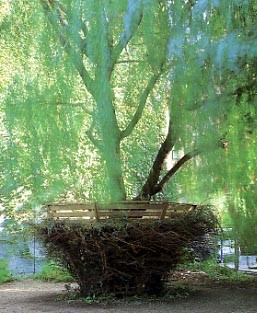Present nostalgia

So we’re moving out of our apartment of 14 years on E. 4th St., and I’m already nostalgic for it. Yesterday, alone in my apartment during the day for the first time in — months? years? — a single ray of sun fell through the window in the kitchen. I had completely forgotten that the apartment does after all get some light for 20 minutes around midday.
I wrote a sort of pastoral poem once about El Jardin del Paraiso, the community garden across the street. For about three hours, I sat in a treehouse and recorded the happenings, ranging from a fly landing on my paper to a protest parade of people dressed like peas and tomatoes. Various children were “major” characters, recurring over and over as they carried a garden chicken (also a recurrent character) around, climbed into the treehouse, explored the pond and its turtles, or simply threw rocks. So, how is my piece a pastoral and how was it not a pastoral? It was not at the time a pastoral because I was attempting to write in the present, thinking more in an investigative poetics vein. But now, a couple of years later, the piece feels like an Arcadian time now past — the chicken is gone, the kids are older, the buildings across the street that I describe were sold, gutted and developed. (The buildings were owned by the Uranian Phalanstery and had some of the most amazing interiors I’ve ever seen, chock-a-block with paintings, sculptures, ashes, costumes, dead cats, books, masks, a bamboo forest in the back, rain pouring through broken windows, original 19th-century lead paint of a rich and complex texture unknown to this century. Now they are little plain white apartments — ticky tacky boxes — going anywhere from $2600 to $3800 per month according to neighborhood speculation.)
The garden is still there, of course, protected by its location next to a school, but it’s a difficult place, full of egos and politics and turf fights. The latest is some older woman complaining to everyone she can nab walking by the garden that her tomato plants were torn out by, alternately, the coop board of the building she lives in, and by another woman who lives down the street. So now there’s this bare patch of earth in a huge garden otherwise filled with weeds and overgrowth. I’m outraged, but I also sense there’s a larger explanation — the person she blames is an energetic community organizer who’s done a lot of good things for the gardens on the block, particularly a different garden, where there’s been another kind of fight going on: a nonprofit that owns a vacant lot has been allowing standing water to breed hordes of mosquitoes. So, OK, I wrote the fly, and the leaves, and the changing of the light as it fell through willow branches, and the kids and the chicken, and the people dressed as vegetables, but how do I write into, about, of the baffling, often spiteful, and sometimes threatening (rumors of garden drug-dealing) interactions over “community” land? I joined the garden too, and tended a plot for a time, but the stressful politics drove me out. At first glance, the garden is a fragment (a figment) of pastoral ideal: children playing, chickens, tending the land. Then, you start talking to people — engaging…
Geometries of landscape